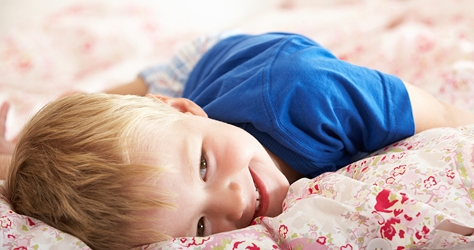Bed wetting and what you can do to help.
Bed wetting is perfectly normal and usually stops happening by around the age of five, but there are ways you can help your child stay dry sooner.
At a glance
- How common is bed wetting?
- What causes bed wetting?
- Treating bed wetting

Little accidents
If your child is still having ‘little accidents’ in the middle of the night, you’re certainly not alone. In fact, it’s fairly common - a sixth of five-year-olds wet the bed two or more times a week.
Despite being as widespread as eczema or asthma, and affecting nearly 800,000 children across the UK, parents don’t tend to talk about it much. But bed wetting is perfectly normal - so if your child is still having problems, don’t worry about a thing.
Who’s affected by bed wetting?
In the UK, it's thought around 1 in 12 children wet the bed regularly at four and a half years old, and 1 in 40 children at seven and a half. It happens with older children too, and about 1 in 100 people wet the bed right into adulthood. For some reason, bedwetting is slightly more common in boys than girls.
What causes it?
There's no obvious reason why children wet the bed and it's certainly not your child's fault. Experts think a few things may cause problems:
-
Producing more urine than their bladder can cope with
-
Having an overactive bladder - meaning it can only hold a small amount of urine
-
Being a very deep sleeper - so they don‘t react to the signals telling their brain their bladder is full
-
They’re constipated – putting pressure on the bladder
-
New emotional distress - such as being bullied or moving to a new school.
In rare cases, bedwetting may be the symptom of an underlying health condition, such as a urinary tract infection or type 1 diabetes. If you’re worried at all, chat to you GP.
Do I need to do anything?
With children under five, bedwetting is only a problem if it starts bothering you or your kids. Many families get help when they think the bedwetting might be affecting their child's social life, for example ruling out sleepovers. But even if you play it down, bed wetting can affect your child's self confidence, so if you’re concerned, why not chat to your GP.
Treating bedwetting
The best thing is usually a few self-help techniques, like drinking less before bed and making sure they go to the toilet every night before going to sleep.
If this doesn’t do the trick, you could try a bedwetting alarm - moisture-sensitive pads that sound an alarm if the child begins to pee. Over time, the alarm should help them wake when their bladder’s full.
Don’t worry about a thing...
It’s important to reassure your child everything is okay. Telling them off or punishing them could actually make the problem worse. Just let them know they're not alone and reassure them it will get better. The vast majority of children simply grow out of it and never look back.